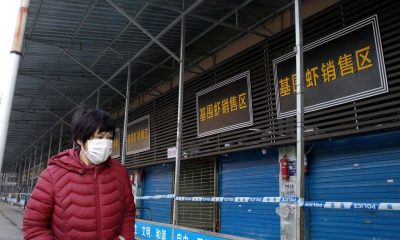World News
How Russia Built a Channel to the Taliban, Once an Enemy
KABUL, Afghanistan — During one of the most violent stretches of fighting in northern Afghanistan, as the Taliban scored victories that had eluded them since the beginning of the conflict, the top U.S. commander went public with a suspicion that had nagged for years: Russia was aiding the insurgents.In diplomatic circles in Kabul around the time of that accusation, in 2017, there were murmurs that the Russian assistance had included night-vision goggles and armor-piercing ammunition.But Gen. John W. Nicholson, the commander, offered no definitive evidence, and that spoke to how confusing the battlefield had become as three longtime adversaries — the Taliban, Russia and Iran — agreed on their common interest in seeing the Americans leave Afghanistan. In the maze of corruption, cash and foreign hands in Afghanistan, it was no easy task to pin down who was doing what."We've had weapons brought to this headquarters and given to us by Afghan leaders and said, 'This was given by the Russians to the Taliban,'" Nicholson said a year later. "We know that the Russians are involved."The recent revelation of an American intelligence assessment that Russia had provided the Taliban with bounties to attack U.S. and coalition troops stunned political leaders in Washington and added a potent dose of Cold War-style skulduggery to deliberations over Afghanistan's future. Both Russia and the Taliban have rejected the assertion.But while that would be a notable escalation of Russian interference in Afghanistan, it was clear to many officials that Russia had been working to hedge its bets with the Taliban for years. The Russians saw the Afghan government as entirely controlled by the United States, and at worst so fragile that it would struggle to survive the U.S. withdrawal.In interviews, Afghan and U.S. officials and foreign diplomats with years of experience in Kabul say that what began as a diplomatic channel between Russia and the Taliban just under a decade ago has more recently blossomed into a mutually beneficial alliance that has allowed the Kremlin to reassert its influence in the region.The shift coincided with increasing hostility between the U.S. and Russia over Syria's civil war and other conflicts, analysts say, as well as Russia's frustration with rising instability in Afghanistan and the slow pace of the U.S. pullout.Now, the U.S. is conducting the troop withdrawal it agreed to with the Taliban even without a final peace deal between the insurgents and the Afghan government which the U.S. has supported for years. But Russia's covert efforts, officials and analysts say, are aimed at harassing and embarrassing the U.S. as the troops leave rather than profoundly changing the course of the conflict."It was in modest quantities; it was not designed to be a game changer on the battlefield," Nicholson, who has since retired from the military, told the House Foreign Relations Committee on Thursday about Russian arms and aid to the Taliban. "For example, the Taliban wanted surface-to-air missiles, the Russians didn't give it to them. So I always concluded that their support to the Taliban was calibrated in some sense."Some pointed out the considerably more extensive U.S. efforts to support the mujahedeen insurgency against the Soviet Union in the 1980s."We did the same," said Marc Polymeropoulos, a former CIA field officer in Afghanistan who retired last year as the agency's acting chief of operations in Europe and Eurasia. "We turned the heat up as the Russians were leaving Afghanistan.""Putin," he said, "is a student of history."As things began turning on the battlefield in recent years, officials described increasing suspicions of a greater Russian role in helping the Taliban. But they often struggled to pin down specifics, other than occasional influxes of new weapons and munitions that could have had several sources. In addition to Pakistan's well-established support to the Taliban, Iran was taking a greater hand in helping the insurgents, and often using similar channels as the Russians, Afghan intelligence officials say.The dots began connecting more clearly during a stretch of alarming violence in northern Afghanistan, when the Taliban twice overran Kunduz city, a provincial capital, in 2015 and 2016, sending the U.S. military scrambling.As Afghan intelligence narrowed in on the ambitious regional Taliban commander behind those assaults, they tracked his travel back and forth across the nearby border with Tajikistan, a Russian intelligence stronghold, according to current and former senior Afghan security officials. Kunduz is also the base of operations for two Afghan businessmen who U.S. intelligence officials say acted as middlemen in the bounty scheme between Russian intelligence officers and Taliban fighters.U.S. officials say they confronted Russia about its aid to the Taliban on several occasions, but their public claims lacked detail, and it never amounted to a major issue. Russian officials said they received no documented evidence.Three decades after the Soviet military withdrawal from Afghanistan, Russia's cultural, economic and personal ties in the country remain deep. When Russia has looked to exert influence, whether benign or otherwise, it has had a host of friends to call on: Soviet-trained generals who led the Afghan forces for years on American pay; businessmen who bragged of friendship with President Vladimir Putin of Russia; politicians who kept homes in Moscow even as they grew rich on U.S. contracts.For much of the first decade of the war, the U.S. did not really have to worry about the deep Russian reach into Afghan society, as Putin's government was aligned with the U.S. mission of defeating al-Qaida and Islamist groups that Moscow also saw as a threat — including the Taliban.Diplomatic cables released by WikiLeaks show genuine attempts by both sides to coordinate efforts in Afghanistan. Russian officials spoke of a "collective fist" in the fight against terrorism, and urged unity "with one voice — the American voice."But as the war in Afghanistan dragged on, and the two powers took opposing sides in the crises in Syria and Ukraine, the Russians increasingly saw the U.S. mission as failed, and the American presence in the region as a threat.U.S. intelligence officials now date Russia's discreet outreach to the Taliban as beginning about eight years ago — around the time that Putin, after a four-year hiatus as prime minister, reassumed the presidency with a more confrontational posture with the West.The mistrust soon became intense enough that Russian officials accused the U.S. of playing a hand in the rise of an Islamic State group chapter in Afghanistan around 2015, with many of its earliest fighters being extremist militants from Central Asia who yearned to bring a holy war against Russia.At a meeting of the Russian Security Council in 2013, Putin said his country could no longer stand by in the face of failures by the U.S. and its partners."We need a clear action strategy, which will take into account different possible developments," Putin said at the meeting. "The task is to reliably protect the interests of Russia under any circumstances."Leading the portfolio on the diplomatic front was Zamir Kabulov, a veteran of the Soviet war in Afghanistan and reportedly a former Russian intelligence operative.Kabulov began publicly criticizing the U.S. for weaknesses in the Afghan government and for failing to rein in Islamist militancy there — and increasingly describing the Afghan Taliban as a national entity that posed no threat beyond the country's borders and could be worked with.Reports increased about Taliban figures making trips to Russia. And just as the U.S. and Taliban were finalizing details of the U.S. withdrawal, Russia brought the same Taliban leaders into Moscow meetings with a large number of Afghan political figures for discussions over the political future of the country.As the U.S. has drawn down its military presence, it has increasingly relied on Afghan partners for intelligence and counterintelligence. What Afghan security officials were seeing in recent years, particularly in the north, was a deeply messy reality.Around the time they began focusing more on Russian activities, the Afghans also unraveled an Iranian scheme of distributing arms to discontented warlords and militia commanders — the weapons were Russian, and the route was through Tajikistan, officials said. The Iranian scheme was short-lived, one senior Afghan official said, after Iran realized the weapons it was providing were turning up in the saturated black market.The Russians often used the hundreds of millions of dollars in fuel imports for NATO and Afghan forces as a way to inject cash into Afghanistan to ensure influence and keep intelligence assets on their side. One former senior Afghan official said that instead of direct cash transfers, the Russians would mostly arrange for the convoys of oil tankers snaking into Afghanistan to be topped with extra fuel that would be cached for circulation inside the country.Though the countries of Central Asia gained their independence after the Soviet collapse, Russia has never let go of its foothold in the region. In one cable, a Russian diplomat described the borders of countries like Tajikistan, where the Russian air force still has about 7,000 troops, as "an extension of its own border."When the Taliban were in power in Afghanistan in 1990s, Tajikistan was a hub for the resistance commanders who received aid from Russia and Iran. In the 20 years since the U.S. invasion, the country has become a center of criminal traffic and of vice, a kind of adult playground for many of the Afghan elite who frequently travel back and forth to Tajikistan and often have family there.In that mix of spies, money and mafia, the Taliban, too, found a foothold. The insurgents made a point of taking and maintaining control of some of the border crossings from Kunduz province into Tajikistan. From the south of the country all the way to the north, they had border access to evade military pressure, maintain ties with friendly foreigners and keep a channel for the opium trade that partly finances the insurgency.Several Afghan officials, including Asadullah Omarkhel, who was the governor of Kunduz at the time, said they shared with the Americans intelligence that Mullah Abdul Salam, the Taliban commander who led the assaults on Kunduz, repeatedly crossed into Tajikistan for what they suspected were discussions with Russian agents. A Tajik news outlet reported meetings between Russian officials and Taliban commanders at a Russian air base in Tajikistan as early as 2015. And it was these border crossings that the Taliban used to bring weapons in, officials say.Omarkhel said Americans initially were not confident about claims of Taliban ties to Russia, but then they started striking the Taliban bases along the border, including a strike that killed Salam.At Thursday's congressional hearing, Nicholson repeated his accusation of Russia arming the Taliban, noting that even though the aid was not extensive, it still had an effect."In the northern part of Afghanistan, in particular in Kunduz, the Russian assistance did help the Taliban inflict higher casualties on the Afghan security forces and more hardship on the Afghan people," he said.This article originally appeared in The New York Times.(C) 2020 The New York Times Company
World News
China Sentences Canadian to Death on Drugs Charges
(BEIJING) — China has sentenced a third Canadian citizen to death on drug charges amid a steep decline in relations between the two countries.
The Guangzhou Municipal Intermediate Court announced Xu Weihong’s penalty on Thursday and said an alleged accomplice, Wen Guanxiong, had been given a life sentence.
Death sentences are automatically referred to China’s highest court for review.
The brief court statement gave no details but local media in the southern Chinese city at the heart of the country’s manufacturing industry said Xu and Wen had gathered ingredients and tools and began making the drug ketamine in October 2016, then stored the final product in Xu’s home in Guangzhou’s Haizhu district.
Police later confiscated more than 120 kilograms (266 pounds) of the drug from Xu’s home and another address, the reports said. Ketamine is a powerful pain killer that has become popular among club goers in China and elsewhere.
Relations between China and Canada soured over the arrest of Meng Wanzhou, an executive and the daughter of the founder of Chinese tech giant Huawei, at Vancouver’s airport in late 2018. The U.S. wants her extradited to face fraud charges over the company’s dealings with Iran. Her arrest infuriated Beijing, which sees her case as a political move designed to prevent China’s rise as a global technology power.
In apparent retaliation, China detained former Canadian diplomat Michael Kovrig and Canadian entrepreneur Michael Spavor, accusing them of vague national security crimes.
Soon after, China handed a death sentence to convicted Canadian drug smuggler Robert Schellenberg in a sudden retrial, and in April 2019, gave the death penalty to a Canadian citizen identified as Fan Wei in a multinational drug smuggling case.
China has also placed restrictions on various Canadian exports to China, including canola seed oil, in an apparent attempt to pressure Ottawa into releasing Meng.
Chinese foreign ministry spokesperson Wang Wenbin said there was no connection between Xu’s sentencing and current China-Canada relations.
“I would like to stress that China’s judicial authorities handle the relevant case independently in strict accordance with Chinese law and legal procedures,” Wang said at a daily briefing Thursday. “This case should not inflict any impact on China-Canada relations.”
Like many Asian nations, China deals out stiff penalties for manufacturing and selling illegal drugs, including the death penalty. In December 2009, Pakistani-British businessman Akmal Shaikh was executed after being convicted of smuggling heroin, despite allegations he was mentally disturbed.
“Death sentences for drug-related crimes that are extremely dangerous will help deter and prevent such crimes,” Wang said. “China’s judicial authorities handle cases involving criminals of different nationalities in accordance with law.”
World News
Hezbollah Will Not Escape Blame for Beirut
(Bloomberg Opinion) — As if the Lebanese haven’t suffered enough. For months, they have been caught between an economic meltdown, crumbling public services and a surging pandemic. Now they must count the dead and survey the extensive damage to their capital after two giant explosions on Tuesday.The blasts, especially the second, were so huge they were reportedly heard and felt in Cyprus. At least 100 people are reported to have been killed — that number will almost certainly rise — and thousands injured. A large expanse of the port and its immediate neighborhood lies in smoking ruin; miles away, streets are full of shattered glass.Prime Minister Hassan Diab’s government says the explosions were caused when careless welding ignited about 2,750 tons of ammonium nitrate, a highly combustible material used as fertilizer and for bomb-making. By comparison, Timothy McVeigh used about 2.4 tons of the same chemical in the 1995 Oklahoma City bombing. The 2015 disaster in the Chinese city of Tianjin was caused by the explosion of 800 tons of ammonium nitrate.The equivalent of 1,100 Oklahoma City-size bombs could indeed account for the devastation and the reddish mushroom cloud that plumed gaudily over the Beirut port. But it doesn’t mean Lebanese will simply accept that the explosion was an unavoidable, force majeure event.Assuming the official account holds up, the disaster again exposes the rot that is destroying the country — an especially corrosive mix of corruption, ineptitude and malign intentions.The ammonium nitrate was apparently seized in 2013 from a Moldovan-flagged ship traveling from Georgia to Mozambique. But someone — who, we don’t yet know — brought it into Beirut; instead of returning, auctioning or disposing of it, the port management inexcusably allowed it to be stored there for years.There are no prizes for guessing who in Lebanon might be interested in keeping such vast quantities of explosive material close at hand. The U.S. Treasury and Israel both believe Hezbollah controls many of Beirut’s port facilities.Diab, whose government is entirely dependent on political support from Hezbollah and its Maronite Christian allies, has vowed to hold those responsible to account. More than likely, some minor officials will be fingered for permitting improper storage of highly dangerous material.Iran-backed Hezbollah, with its large and well-armed militia as well as its political hold on the prime minister, has nothing to fear from the state. But it will not escape public opprobrium: Most Lebanese will assume the ammonium nitrate belonged to the militia, for use in Syria and against Israel.Why the chemicals exploded is another matter, rich with possibilities of conjecture. In the court of public opinion, the usual suspects will be rounded up from the ongoing shadow war between Iran and Hezbollah on one side and Israel on the other. President Donald Trump, who can be relied upon to make everything worse, speculated it was a deliberate attack. This will be picked up and amplified by conspiracy theorists in the Middle East.But suspicions of Hezbollah’s culpability will intensify on Friday when a United Nations special tribunal for Lebanon that has been looking into the 2005 assassination of former Lebanese Prime Minister Rafik Hariri is expected to issue verdicts in cases against four Hezbollah cadres being tried in absentia. The men are in hiding, and have not been seen in years; even if they are found guilty, no one expects them to be handed over. Hariri, remember, was killed in a massive blast.A guilty verdict would increase domestic pressure on Hezbollah, its allies and the government. When Lebanese have finished mourning their dead, anger will return — the kind that fueled the massive street demonstrations that brought down Diab’s predecessor last October.Even without the Beirut blasts, the timing of the verdict would have been awkward for Diab, who is struggling to negotiate an economic bailout with the International Monetary Fund: Among the hurdles is Hezbollah’s resistance to the necessary reforms. Hezbollah finds itself uncomfortably positioned as the principal backer of the government presiding over a thoroughgoing collapse of the Lebanese state and society. It will not easily shake off blame for the Beirut blast, or for the Hariri assassination. Even in this country that has suffered so much and for so long, the latest of Lebanon’s tragedies will not soon be forgotten, nor its perpetrators forgiven.(Corrects the number of Oklahoma City-size bombs that would equal the size of the Beirut explosion in the fourth paragraph.)This column does not necessarily reflect the opinion of the editorial board or Bloomberg LP and its owners.Hussein Ibish is a senior resident scholar at the Arab Gulf States Institute in Washington. For more articles like this, please visit us at bloomberg.com/opinionSubscribe now to stay ahead with the most trusted business news source.©2020 Bloomberg L.P.
World News
Survivors Mark 75th Anniversary of World’s First Atomic Attack
(HIROSHIMA, Japan) — The dwindling witnesses to the world’s first atomic bombing marked its 75th anniversary Thursday, with Hiroshima’s mayor and others noting as hypocritical the Japanese government’s refusal to sign a nuclear weapons ban treaty.
Mayor Kazumi Matsui urged world leaders to more seriously commit to nuclear disarmament, pointing out Japan’s failures.
“I ask the Japanese government to heed the appeal of the (bombing survivors) to sign, ratify and become a party to the Treaty on the Prohibition of Nuclear Weapons,” Matsui said in his peace declaration. “As the only nation to suffer a nuclear attack, Japan must persuade the global public to unite with the spirit of Hiroshima.”
His speech highlights what survivors feel is the hypocrisy of Japan’s government, which hosts 50,000 American troops and is protected by the U.S. nuclear umbrella. Tokyo has not signed the nuclear weapons ban treaty adopted in 2017, despite its non-nuclear pledge, a failure to act that atomic bombing survivors and pacifist groups call insincere.
The U.S. dropped its first atomic bomb on Hiroshima on Aug. 6, 1945, destroying the city and killing 140,000 people. The U.S. dropped a second bomb three days later on Nagasaki, killing another 70,000. Japan surrendered Aug. 15, ending World War II and its nearly half-century of aggression in Asia.
Survivors, their relatives and other participants marked the 8:15 a.m. blast anniversary with a minute of silence.
Thursday’s peace ceremony at the Hiroshima Peace Memorial Park was scaled down because of the coronavirus pandemic. The fewer than 1,000 attendees was one-tenth of those attending in past years.
Some survivors and their relatives prayed at the park’s cenotaph before the ceremony. The registry of the atomic bombing victims is stored at the cenotaph, whose inscription reads “Let all the souls here rest in peace for we shall not repeat the mistake.”
Prime Minister Shinzo Abe, in his speech at the ceremony, said Japan is committed to nuclear weapons ban but a nuclear free world cannot be achieved overnight and that it has to start from dialogue between opposite sides.
“Japan’s position is to serve as a bridge between different sides and patiently promote their dialogue and actions to achieve a world without nuclear weapons,” Abe said. Nuclear policies are divided amid a harsh security environment, so it is necessary to create common ground first, he said.
U.N. Secretary General Antonio Guterres said there is nothing in between.
”The only way to totally eliminate nuclear risk is to totally eliminate nuclear weapons,” he said in his video message from New York for the occasion.
“Seventy-five years is far too long not to have learned that the possession of nuclear weapons diminishes, rather than reinforces, security,” he said. “Today, a world without nuclear weapons seems to be slipping further from our grasp.”
An aging group of survivors, known as hibakusha, feel a growing urgency to tell their stories, in hopes of reaching a younger generation. Many peace events, including their talks, leading up to the anniversary had been cancelled due to the coronavirus, but some survivors have teamed with young students or pacifist groups to speak at online events, sometimes connecting with international audiences.
On the 75th anniversary, elderly survivors, whose average age now exceeds 83, lamented the slow progress of nuclear disarmament.
They expressed anger over what they said was the Japanese government’s reluctance to help and listen to those who suffered from the atomic bombing.
“Abe’s words and actions don’t seem to match,” said Manabu Iwasa, 47, who came to the park to pray for his father, a survivor who died at age 87 in March. “Japan apparently sides with the U.S. and make more effort toward nuclear weapons ban,” he said. “It’s frustrating, but there is not much we individuals can do.”
Keiko Ogura, 84, who survived the atomic bombing at age 8, wants non-nuclear states to pressure Japan into signing the nuclear weapons prohibition treaty. “Many survivors are offended by the prime minister of this country who does not sign the nuclear weapons prohibition treaty,” said Ogura.
She and other members of her group of English interpreters are providing a virtual tour of the park from the cenotaph, reaching out to audiences from around the world.
Survivors also urged world leaders, especially those from nuclear weapons states, to visit Hiroshima and see the reality of the atomic bombing.
-
 Business2 weeks ago
Business2 weeks agoBernice King, Ava DuVernay reflect on the legacy of John Lewis
-
World News2 weeks ago
Heavy rain threatens flood-weary Japan, Korean Peninsula
-
 Technology2 weeks ago
Technology2 weeks agoEverything New On Netflix This Weekend: July 25, 2020
-
Finance3 months ago
Will Equal Weighted Index Funds Outperform Their Benchmark Indexes?
-
Marketing Strategies7 months ago
Top 20 Workers’ Compensation Law Blogs & Websites To Follow in 2020
-
 World News7 months ago
World News7 months agoThe West Blames the Wuhan Coronavirus on China’s Love of Eating Wild Animals. The Truth Is More Complex
-
Economy9 months ago
Newsletter: Jobs, Consumers and Wages
-
 Finance8 months ago
Finance8 months ago$95 Grocery Budget + Weekly Menu Plan for 8

